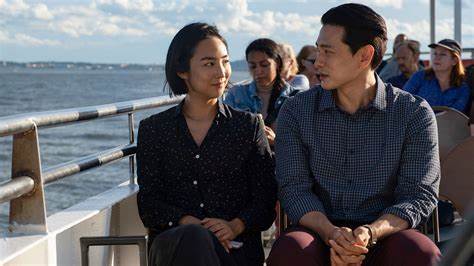
05 Jul ‘Past Lives’ Review: A Heartbreaking and Empathetic Reflection on Circumstance
By Arman Saxena
Many have likened A24’s latest to Richard Linklater’s “Before” Trilogy. And the similarities lie in their central conceits, both works follow two people meeting many years after forming a romantic bond. Aspects of Past Lives reminded me of ‘Before Sunset’ in its contemplation of meeting someone you haven’t really moved on from. Ethan Hawke once said that “the first film (Before Sunrise) is about what could be; the second (Before Sunset) is about what should’ve been. Before Midnight is about what is.” We watch as Past Lives’ Nora (Greta Lee) experiences all of these stages, just not in the way you might think.
Just like with the ‘Before’ trilogy, the film is a rumination on coincidence and the effects of our circumstances. The Korean concept of In-Yun is one that is weaved throughout the film. It refers to the growing connections formed between two people whose roads cross over multiple lifetimes. The more lifetimes shared, the stronger the connection between the two. The film is enamored with this concept and the question of destiny’s role in the little coincidences and connections that make up our daily lives. As characters mention throughout the film, spouses are believed to have met in over 8000 past lifetimes, forming that deep marital bond over millennia. The idea of In-Yun becomes even more poignant in the context of the film as Nora and Hae Sung (Teo Yoo) meet at multiple very different stages of their life, years separating each encounter.
Song’s film isn’t just a romantic story but a story about the immigrant experience and everything that comes with it, from interracial relationships to adapting to a new language. Na Young and Hae Sung grow up together in Seoul and are each other’s first major crush. Days before Na Young’s family plans to move to America, they go on their first date and clearly have strong feelings for one another. But Nora leaves for America and they lose contact. We see Na Young adopt her new American name Nora, learn English, and prepare to adapt to this foreign world. Later on in the film, we hear Nora talk about how she had no one she could cry to as a child in America. Her new world quickly taught her to hide her emotions and not let anyone know when she was feeling awful or confused. It’s a common first generation American immigrant experience to consciously hold back certain parts of yourself to assimilate more comfortably into the American world, and it’s an experience that Song illustrates with specificity and care.
This is a film that lives and dies on its screenplay. While there are fantastic visuals (the cityscapes, the park where young Nora and Hae Sung play, etc.), the movie is anchored by Celine Song’s empathetic, heartbreaking, and occasionally hilarious screenplay. But what struck me the most was what was left unsaid. There are moments throughout the film where Nora and Hae Sung just look at each other, their eyes telling each other more than what can be said with words. It’s in these moments where the two central performances really shine. Though one cannot leave out the wonderful John Magaro, who’s vulnerable, soul-baring turn was my favorite performance from the film. Some of Magaro’s best moments are pretty much wordless, his looks do enough to convey the mix of love, fear, insecurity, care, and discomfort he experiences. Unlike the ‘Before’ trilogy, Past Lives doesn’t really spend moments just lingering with its characters. While Linklater’s films were built on scenes of characters going on philosophical tangents for most of the runtime, we also spent more time really seeing the characters for who they were. It really feels like no moment is wasted. Granted, these are two quite different films and I am not finding fault with Past Lives for failing to be a ‘Before’ copycat but instead just trying to point out that I never really fall in love with Nora and Hae Sung they way I fell in love with Celine and Jesse because we as an audience don’t really get to sit with them and when we do it’s for brief moments. But like with the ‘Before’ trilogy, what they say to each other in these moments together isn’t as significant as their flickering glances, shared stares, and genuine smiles. These moments are what make the best romantic dramas and Past Lives is one of the best romance films of the decade so far, if not the best.
Score: 4/5
